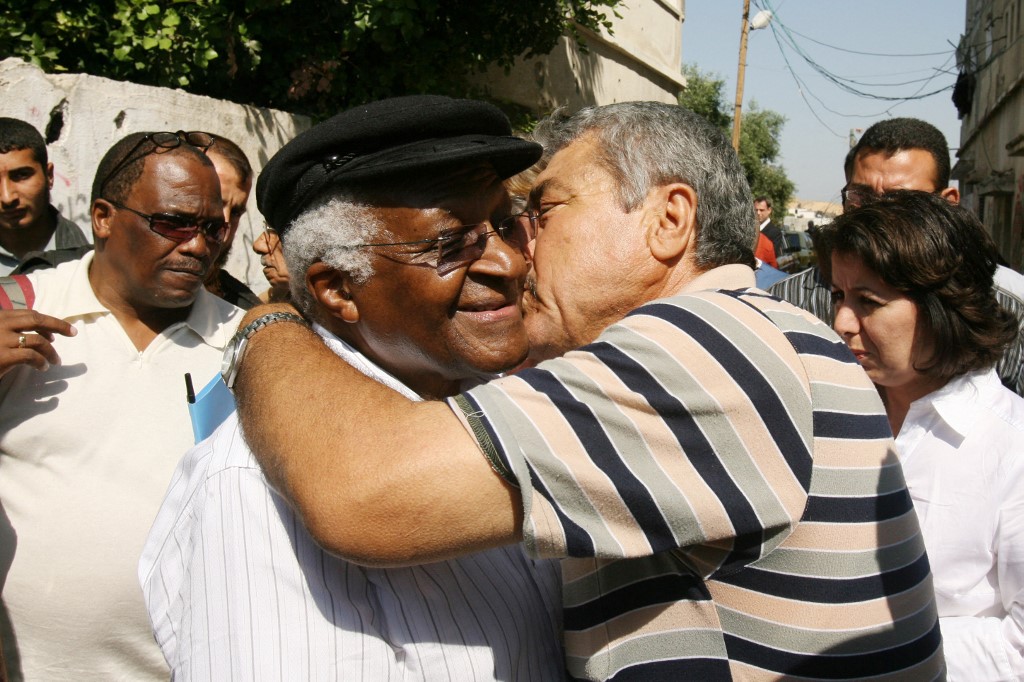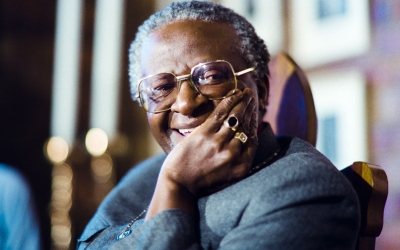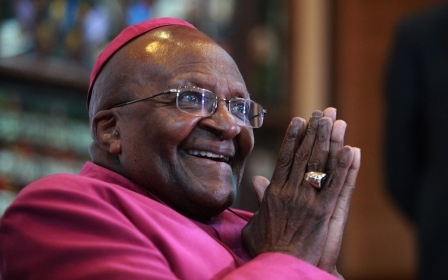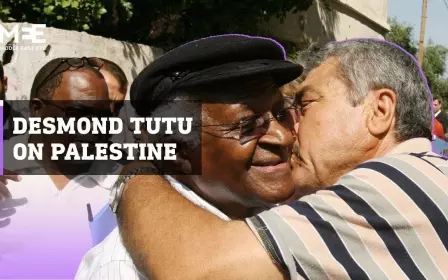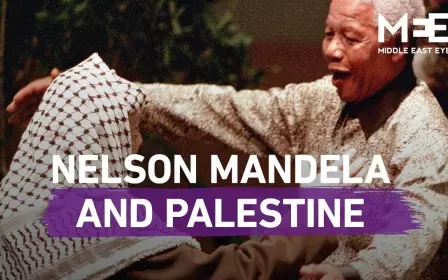Funeral of Archbishop Tutu, champion of the Palestinians, takes place in Cape Town

The funeral of Archbishop Desmond Tutu, great hero of the struggle against the repressive, racist South African apartheid regime, took place on Saturday in Cape Town.
The Nobel Peace prize laureate died on Sunday, aged 90.
A contemporary of Nelson Mandela, Tutu was known not just for his role in ending a dark chapter of racial discrimination in his country but also for speaking out against injustices around the world, including in the Middle East, where he had been an outspoken critic of the Israeli occupation of Palestine and the siege on Gaza.
South Africa's President Cyril Ramaphosa lauded the late archbishop as "our moral compass and national conscience" as South Africa bade farewell at the New Year's Day state funeral.
"Our departed father was a crusader in the struggle for freedom, for justice, for equality and for peace, not just in South Africa, the country of his birth, but around the world," Ramaphosa said, delivering the main eulogy at the service in St George's Cathedral, Cape Town, where for years Tutu preached against racial injustice.
New MEE newsletter: Jerusalem Dispatch
Sign up to get the latest insights and analysis on Israel-Palestine, alongside Turkey Unpacked and other MEE newsletters
'I wish I could keep quiet about the plight of the Palestinians. I can't!'
- Archbishop Desmond Tutu
Tutu had been a passionate critic of the Israeli occupation of Palestine.
"I wish I could keep quiet about the plight of the Palestinians. I can't! The God who was there and showed that we should become free is the God described in the Scriptures as the same yesterday, today and forever," he told the Washington Post in 2013.
He drew parallels between Israeli occupation and apartheid in South Africa.
"What's being done to the Palestinians at checkpoints, for us, it's the kind of thing we experienced in South Africa."
Tutu was to lead a UN fact-finding mission with Professor Christine Chinkin to investigate a November 2006 Israeli attack on Gaza's Beit Hanoun district that led to the deaths of 19 Palestinians, including seven children.
Israel refused to grant Archbishop Tutu and Professor Chinkin authorisation to enter Gaza, but they were eventually able to travel to the besieged territory via Egypt. They met with survivors and eye-witnesses and produced a report to the Human Rights Council.
'The entire situation is abominable'
In a May 2008 statement about his mission, the archbishop decried the Israeli siege on Gaza, in place since 2007, as "a gross violation of human rights". He also said the Israeli siege contradicted the Jewish and Christian scriptures.
"Those scriptures speak about a God: a God of the Exodus, a God notoriously biased in favour of the weak, of the oppressed, of the suffering, of the orphan, of the widow, of the alien," he said.
"We are in a state of shock, exacerbated by what we subsequently heard from the victims and survivors of the Beit Hanoun massacre. For us, the entire situation is abominable," the joint statement by Desmond Tutu and Professor Chinkin said.
"We believe that ordinary Israeli citizens would not support this blockade, this siege if they knew what it meant for ordinary people like themselves. No, they would not support a policy which limits fuel supplies or automatically cuts off the electricity supply.
"They would not support a policy which jeopardizes the lives of ordinary men and women in hospital, that cuts off water and food from hospitals jeopardizing the lives of babies."
In August 2009, Desmond Tutu joined a delegation of the international NGO "The Elders" in a visit to Israel and occupied Palestinian territories to advocate for peace.
Most recently, in an article published in the Israeli newspaper Haaretz in 2014, Desmond Tutu declared his support for the international movement of boycott, sanctions and divestment as a peaceful means of opposing Israeli occupation.
"Those who continue to do business with Israel, who contribute to a sense of 'normalcy' in Israeli society, are doing the people of Israel and Palestine a disservice. They are contributing to the perpetuation of a profoundly unjust status quo," he wrote.
The archbishop voiced his opposition to acts of violence by both sides of the conflict, although he described Israel's response to Palestinian missiles as "disproportionately brutal".
"I have condemned those in Palestine responsible for firing missiles and rockets at Israel. They are fanning the flames of hatred. I am opposed to all manifestations of violence.
"Missiles, bombs and crude invective are not part of the solution. There is no military solution.
"The solution is more likely to come from that non-violent toolbox we developed in South Africa in the 1980s, to persuade the government of the necessity of altering its policies."
'A giant, morally and spiritually'
The sun shone brightly after the requiem mass as six white-robed clergy acting as pallbearers wheeled the coffin out of the cathedral to a hearse, Reuters reported.
Tutu's body will be aquamated (an environmentally friendly form of cremation) and then his ashes interred behind the cathedral's pulpit in a private ceremony.
"Small in physical stature, he was a giant among us morally and spiritually," said retired Bishop Michael Nuttall, who served as Tutu's deputy for many years.
Life-size posters of Tutu, with his hands clasped, were placed outside the cathedral, where the number of congregants was restricted in line with Covid-19 measures.
Archbishop of Canterbury Justin Welby, who leads the global Anglican Communion, said in a recorded message: "People have said 'when we were in the dark, he brought light' and that... has lit up countries globally that are struggling with fear, conflicts, persecution, oppression."
Middle East Eye delivers independent and unrivalled coverage and analysis of the Middle East, North Africa and beyond. To learn more about republishing this content and the associated fees, please fill out this form. More about MEE can be found here.


